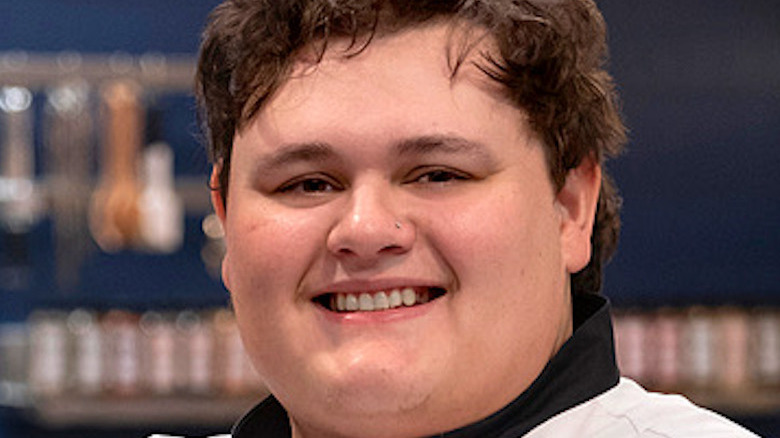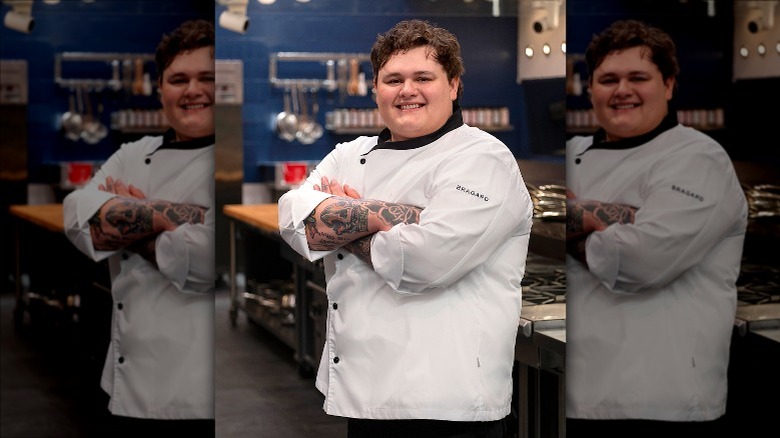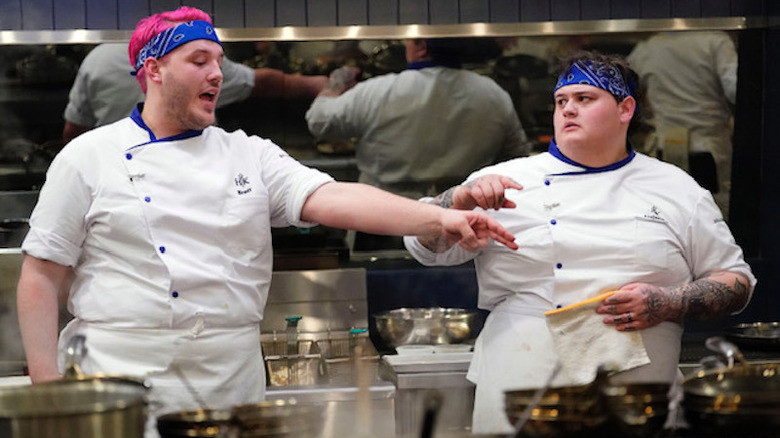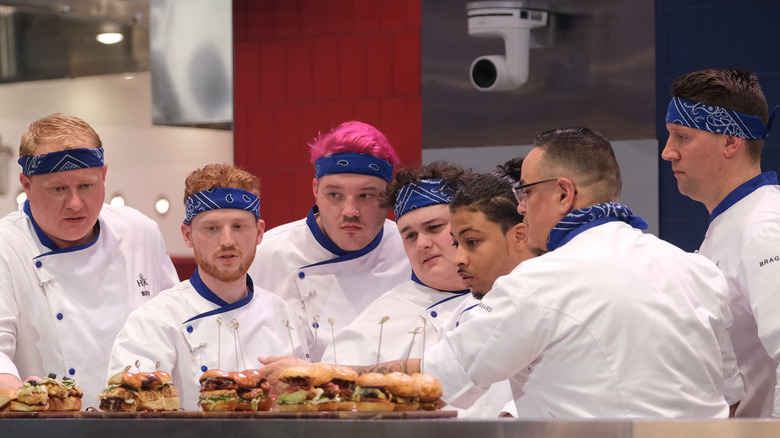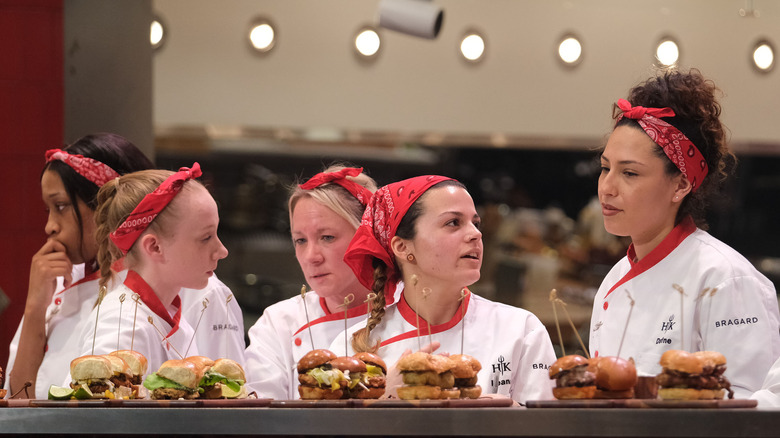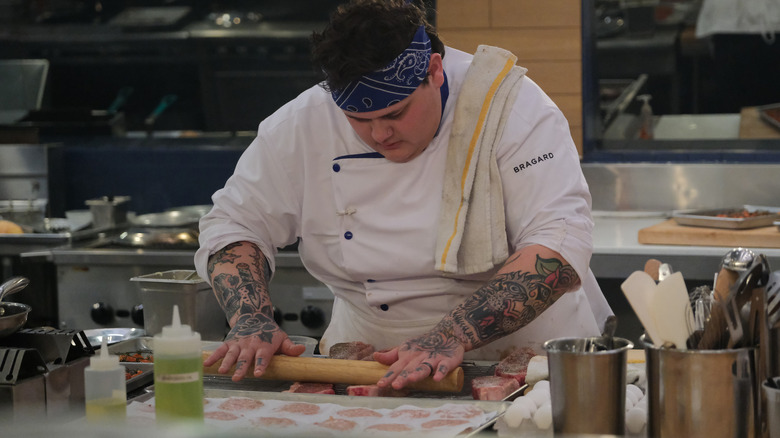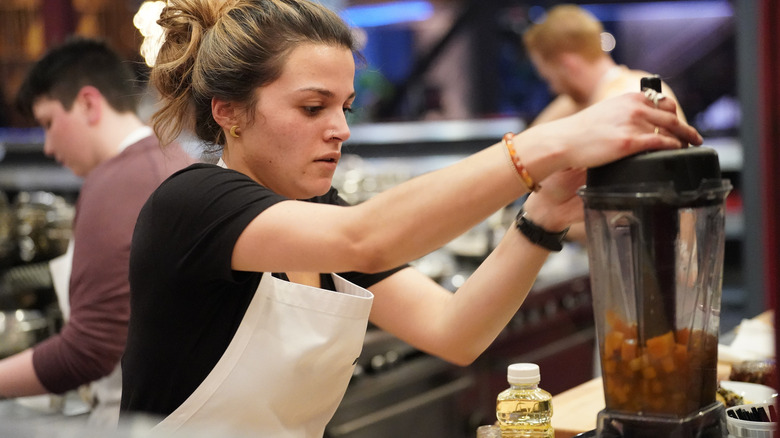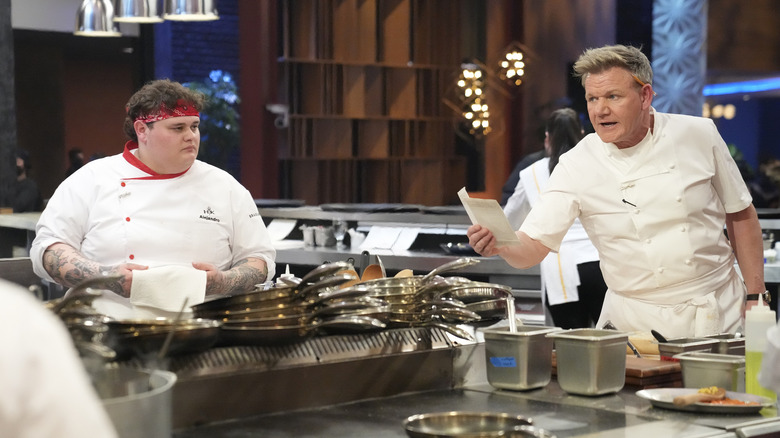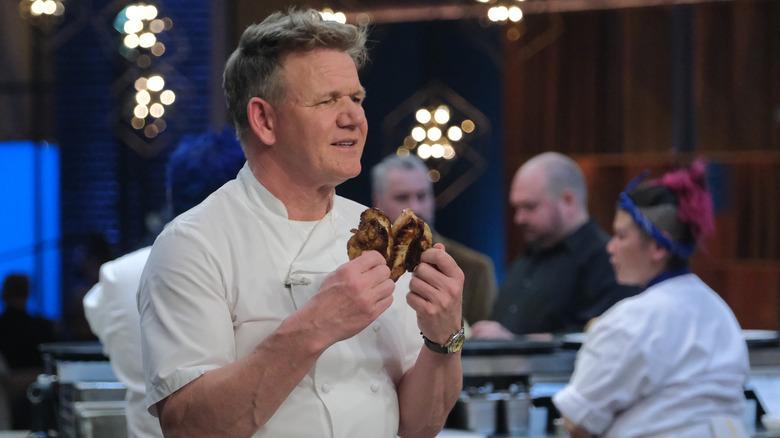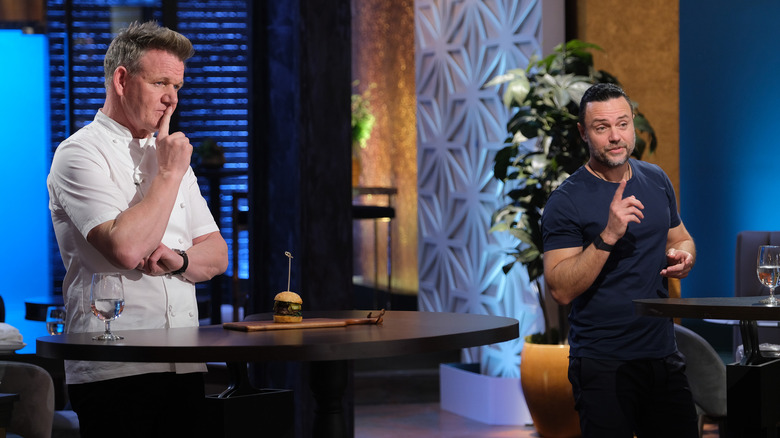Alex Najar Takes Us Behind The Scenes Of Hell's Kitchen Season 21 - Exclusive Interview
Running for 21 seasons and counting, "Hell's Kitchen" is a paradox of anxiety-inducing entertainment and high level culinary competition. The stakes are high, the emotions run even higher, and you never know what host Gordon Ramsay is going to say or do next. The show has fostered a lot of curiosity over the years about what it's really like to compete on the show and put your career on the line in front of some of the most acclaimed chefs in the business. Not to mention, the reality show aspect of living in a dorm with all your competitors where there is bound to be more drama than raw entrees during service.
As the newest season of "Hell's Kitchen: Battle of the Ages" gets underway, Mashed got the inside scoop on everything that happens in and out of the kitchen, speaking recently with current Season 21 competitor, Alex Najar. In an exclusive interview, Najar shared a "Hell's Kitchen" behind-the-scenes look like you've never seen before. He opened up about all the nitty gritty details about the show that you don't see on camera – from the dynamic between the competitors, to the living conditions when the cameras are off, and so much more. He also got personal about the impact of the show and the opportunity to work with Chef Ramsay.
Alex Najar on making it to Hell's Kitchen
Start by telling me a little bit about your background and how you got onto "Hell's Kitchen."
I'm completely self-taught. It's my 15th year in the industry, so the last 10 and a half, 11 years, I've been completely self-taught, which is super difficult. I went to culinary school and I hated it, and I was like, "This sucks. It's not for me." I had the mindset to teach myself [through] cookbooks and seeing what other chefs are doing around the world.
I had never really wanted to do "Hell's Kitchen" or any show like that. I was minding my own business one day and got an email, a text message, Facebook message, and Instagram DM from a casting producer from "Hell's Kitchen" and immediately said yes. She called me. We had a 45 minute conversation, and this was Sunday, so the next day, they set up a Zoom interview for me and here I am.
How's your experience been so far, competing on "Hell's Kitchen"?
It was such a great experience. Meeting Chef Ramsay was the highlight and the peak, but what people don't realize is all the people that you meet while you do this — the cast, the producers, [etc.]. As soon as filming wrapped, we all got each other's numbers, and we have talked every single day since we got back. These last nine months we've been constantly talking to each other, which is awesome. I didn't go in expecting to meet and make so many great friends, and I'm super grateful for that. That's the icing on the cake, for sure.
The Hell's Kitchen experience is not like what you see on TV
Had you watched previous seasons of the show before you competed?
A little bit when I was younger, and then when I found out I was going to be on the show, we had two weeks before we shipped out and I binge watched as much as I could. I'm like, "All right, I've got to get myself ready." And then, we had to quarantine in a hotel, so that was watching Seasons 16, 17, and 18. None of those experiences were even close to what we've been through, so it didn't help at all.
How accurate does the show that we're seeing depict your actual experience? It seems like not much at all.
When they go through editing, it's always different. I so badly wish I could pay somebody to give me all the extra footage, because it was a totally different experience. [The producers are] more focused on the drama, the cooking, and stuff like that. They don't capture conversations that we have in the dorm that are wacky, off the wall, or during dinner service. [That's] totally fine, because you don't want [some of] it to be on TV, because you're going to look like an ass.
In terms of the challenges, the cooking, what you're doing on camera, did you feel like you had a good idea of what to expect going in? Or, was it just a complete whirlwind, from the moment you got there?
Both. I'm not the type of person that gets shocked very easily, but I was shocked multiple times on this show, which is great. I love that, because I love being pinned up against the wall and working from there. I definitely had my own ideas, going in, of what to expect, and none of that matters because once you get into a kitchen you're not familiar with, you're cooking with people you've never cooked with, you have so many cameras in your face, and it's hot as hell in there.
Then, you have one of the best chefs of all time, yelling at you or talking to you, which is super weird in a good way. Anything I ever prepared for, it went out the window on day one.
Competitor Alex Najar says this is the biggest misconception about Hell's Kitchen
There's been a lot of media over the last 20 seasons of "Hell's Kitchen," talking about what it's like behind the scenes. What are some things about the show and what goes on when the cameras are on or off, that you think people don't really know or understand?
The Internet's harsh — that's how people are. There's a lot of people who are fans of the show that watch it, and they're like, "I don't like this person, I don't like that person." I lived with those people for a month and everybody's so much different off camera than on camera. There were some conversations or cooking things that didn't get captured, and I totally get it. It is for TV. They want to make it super entertaining.
It seems like every season they paint a picture that all of you guys that your dynamic is just nothing but competitive.
Very much so. It was really weird. When it was time to start cooking, competition mode was turned on for everybody. In the dorms, we were relaxed, we had whatever amount of time we had to sit down and talk about it, get to learn about each other. As soon as a challenge [took place], it was like ... a team challenge, we're working as a team for this one. If it was individual, I'm on my own by myself, ready to do what I got to do.
When it came to dinner service, you see it. If you don't work as a team, you're screwing yourself, and that's when it really separates itself from the super competitive people and the people that are trying to stay afloat, while they're drowning a little bit.
How much of that switch is inherent? Is it an unspoken thing, or are the producers there, encouraging that as well?
What you see during challenges and services is raw. There's no producer coming in. The only thing that happens with producers is right before a challenge, they'll stop us and they go over the rules. That way, we all know what we're doing. Other than that, it's fight or flight, which is crazy, because I had some ideas going in of, is it somewhat scripted? No, there's no script at all. They're smart with it. They get a lot of egotistical chefs and pit them up against each other, which is awesome.
Battle of the Ages is a learning experience for all the chefs, says Alex Najar
Your season is the battle of the ages – the 20-somethings versus the 40-somethings. Are there [cliques] between the older chefs and the younger chefs?
A little bit. It's such a unique situation, because the 40-somethings, they have years of more experience than what we have. At the same time, some of them haven't worked on a line in years. They're used to doing paperwork, running a business. As for the 20-somethings, ... a lot of the young guys on the team were line cooks, sous chefs, so they're working the line every single day, so this is just another day for them. It's just a matter of figuring out how to work with the people you've never worked with.
At the beginning it was cliquey, because [when] you get put into a group, you're like, "This is my group, this is who I'm going to talk to." Once you get comfortable after the third day — because you're sharing bathrooms with people, rooms with people — you have no choice but to get comfortable with people you don't know. That cliqueness ran out.
I've seen so many episodes now, since I've been home, and a lot of people are mean to each other. We actually all got along pretty well. There were some problems where situations happened. There was tough love for sure. We were all one giant clique, which is really weird. I didn't expect that going into it at all.
What a typical day looks like on the set of Hell's Kitchen
How much free time do you guys have between filming and what do you guys normally do with that time?
Not much free time. The cool thing was if you made it for the first week, Sunday, you go back to the hotel. That's like your time to catch up on sleep, watch some TV. Keep in mind we don't have any cell phones, any of that. They take it all the night before we start filming.
On set, what a lot of people don't see, especially with TV, is there's a lot of stop and go. When you see people running at the beginning of the challenge, we do it three different times. There's a lot of stop and go, explaining the rules, what ingredients we possibly could have, somebody has to use the bathroom, whatever. It all revolved around Chef Ramsay's schedule, because that guy is busy. I'm sure he was recording a few other shows.
When we had time, we hung around. We had a jacuzzi in the dorm, which is nice, so we dip our feet in there. By the third day, we were all pretty worn out. Free time was just after the challenge, and then the winning team gets a reward. You do confessionals, which is when you sit in front of the camera and talk. Usually, you have a couple hours before service, but there's not much free time, because you're worried, you're nervous to go do service. After service, there's usually a few hours, then you do eliminations, and after that, it's pretty much you go to bed or you stay up and do confessional stuff.
On a typical day, what time are you waking up and going to bed?
We would wake up by 5:00 a.m., sometimes 4:30 in the morning, sometimes 6:00 a.m. It depends, and this was during COVID, so we lived in a bubble. Right when they wake you up, whether it's for a challenge or they've got some stuff going on over the speakers, and you're waking up out of a great dream, you do your COVID testing, you get mic'd up, and then you're filming 18 to 20 hour days.
Usually when I'm done working a 15 hour day at work, I'm so wired, it's so hard for me to go to bed. A lot of us wouldn't even go to bed until 2:00 in the morning, and then were up again at 6:00 a.m. and it was cooking and go, go, go. I've had conversations with people [who ask], "Do you get to relax?" I'm like, "Not really." It's hardcore, it's energy. I have never drank Red Bull as much as I did on the show.
What the contestants eat while filming Hell's Kitchen
What do you guys eat?
What's really awesome is that they have a notebook for groceries. It was every other day that they would go grab groceries for us. People who smoked, they got cigarettes. There wasn't a lot of drinking, because if you're cooking the next day, you don't want to be hungover, and people get hurt. I went back to eating like I did when I was in high school or in college. It was Hot Pockets, granola bars, and Gatorades.
You guys are cooking for yourselves?
We had a couple people on the show that cooked for us. Vlad would make dinner every single night. Tara is a mother, so she would make everybody breakfast every morning, which is awesome. It was a matter of grabbing a quick bite to eat for lunch real quick to get ready. We had a lot of people that cooked for us and it was awesome. We all took turns. It was like a big happy family.
Gordon Ramsay garners so much respect and adoration on Hell's Kitchen
Let's talk a little bit about Gordon Ramsay. Based on what you had heard about him going into the show, how did your expectations line up with your actual time working with him?
We all see him on TV. We know how he's portrayed. Going into it, I was super nervous, but I was ready to be picked on and stuff like that. Going into it was super nerve-wracking, especially meeting him for the first time. I was like, "Oh man, he's already going to start."
That man is probably one of the greatest people I've ever met in my life. At 28 years old, I'll say that now. We had won the first challenge, so we got to go out and eat dinner with him. We had conversations with him that nobody else ever, unless you've been on the show or you're friends with him or family, will ever have, and that really changed a lot of perspectives.
I have people that come up to me all the time, they were like, "How was Gordon? Did he yell at you?" I'm like, "Yeah, but he was such a nice man." We had conversations that probably will never get aired, which I'm cool with, because it's something that's super sentimental to me now. Yeah, he's the way he is on camera, because he brings in a bunch of chefs that you think they should know what they're doing, and he even shows you four, five times. He's super awesome about that. When it comes time to actually do it, if you don't, then he gets angry.
What a lot of other people don't realize is, his American restaurants are dedicated to Americans. When you go over to the U.K., he's got [17] Michelin stars. He's the pinnacle top chef of all time. Those are the same stipulations that he wants us to work under. We're cooking steaks and stuff, but it has to be perfect. Every time he yelled, I was like, "I get why you're yelling." I yell at the same thing.
Getting to know him on a more personal level, does that make it any less intimidating when you're about to put a plate in front of him?
Not really, because you have to set those boundaries. He's not there to be friends with you. You're essentially interviewing for one of the best jobs that you could get. It's a $250,000 salary. You get to work for Gordon Ramsay's company. It's a resume builder like no other. You have to take it seriously. When you're presenting any kind of food, it doesn't matter what kind of situation you're in, playful or not, it has to be perfect, and it's never less intimidating at all.
Alex Najar on the most important learning experiences from Hell's Kitchen
In general, do you feel like you learned a lot as a chef, from this experience?
Yeah, absolutely. I learned that I need to be in shape more, mentally and physically. There's a lot of stuff that I have realized that maybe I took a backseat on, technique wise. You [start to realize that you're] working for a chef that is literally one of the best. You have to look in the mirror and be like, "Oh, s***, there's a lot of stuff that I still need to learn and do and get back to." It really helped. I learned a lot, not really food wise, but basics and how to run a kitchen, how to clash with big personalities when you're trying to work through dinner service and stuff. It was a great experience.
It's not totally clear how involved Gordon Ramsay is in terms of teaching you guys as you go. What was the most useful cooking tip you learned from him?
The way he does fish. I have always cooked it skin side down, or whatever that may be. His technique [is to] sear it on both sides, and then you let it chill out for a little bit on a hotspot. Right before it's time to serve, you butter baste it. It turns the fish almost like Jell-O. It's perfectly cooked. For me, cooking fish [was] ... all fish [were] the same. This was totally different.
Seeing his demo of the lobster, that's iconic. A lot of people don't realize that there's a lot of meat inside lobster. It's usually a tail and claws and it's like, "That's why it's so expensive." The way he extracts all of that stuff out of there, I would never think to do that.
Alex Najar talks guest judges and wild challenges on Hell's Kitchen
Who for you was the most exciting guest star judge this season?
Without getting into too many spoilers so far, I don't know how much I can say. I wish I could say a lot, but Fox would be on my ass. I would say, honestly, Gordon Ramsay, and then meeting chef Jay [Santos] and Chef Christina [Wilson] was amazing.
David Myers was awesome to meet. His restaurant, Adrift, in LA is a Michelin star restaurant. We were doing sliders, and he opened up a burger spot recently. It was really nice to see a Michelin star chef come down to do burgers and do it really well. So, that guy was awesome.
It seems like the challenges keep getting wilder and wilder every season. Do you guys get any advanced notice or time to prepare, or you get thrown in blind?
We get thrown in blind. As the season progresses, there's a lot of blank taste tests. The wings threw us off for a loop. We didn't know until we saw the guy fall and we were like, "We got a chicken wing challenge."
[During another] episode, we get woken up out of our sleep and we go outside and there's a 45-foot water slide. We were like, "Oh s***, what is this?" Then it was explained, it's sliders, and we're like, "Oh, god." It's 6:30 in the morning, and LA is cold at 6:30 in the morning, especially jumping in water.
Did anybody get hurt this season? Did we set the kitchen on fire? Anything wild like that?
Nothing crazy, thankfully. A big thing we were all worried about was COVID, because if somebody got COVID, it shut everything down. There were a couple burns and cuts, the normal run of the mill stuff. I'm currently watching Season 19. There's three people that left due to injury, so I was super thankful that none of that happened. I got burned pretty badly. I nipped myself a few times, but [that's] normal kitchen stuff.
New episodes of "Hell's Kitchen: Battle of the Ages" air every Thursday at 8:00/7:00 p.m. CT on FOX, and you can stream episodes on Hulu.
This interview has been edited for clarity.
